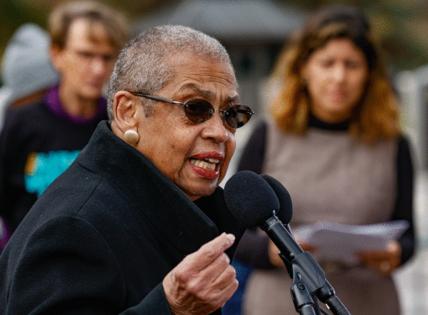House takes aim at cashless bail in DC
Published in News & Features
WASHINGTON — House Republicans this year have pursued an aggressive oversight agenda for Washington, D.C., and they wasted little time returning to it after reopening the government.
On Wednesday the House passed two bills aimed at rolling back criminal justice laws, with help from a number of Democrats. One would require cash bail for certain offenses in D.C., making it easier to lock up defendants before they go to trial. The final vote was 237-179, with 28 Democrats joining Republicans in favor.
The other would repeal a controversial 2022 policing law that banned chokeholds, established a police complaints board and expanded access to body camera videos. The vote was 233-190, with 20 Democrats supporting it.
“Here we are one week after the end of the shutdown, after a truly harrowing several days dealing with the Epstein petition, and what are you guys putting on the floor? Bills to micromanage D.C. affairs,” Rep. Melanie Stansbury, D-N.M., a member of the House Oversight and Government Reform Committee, said during debate ahead of the vote.
Both bills now head to the Senate, where seven Democrats would have to vote with all Republicans to overcome a filibuster and send the legislation to President Donald Trump.
“Cashless bail allows dangerous, violent criminals on our streets. For far too long, dangerous criminals have been allowed to roam the streets of Washington, D.C., posing a threat to the general public,” said Oversight Chair James R. Comer, R-Ky., on the floor.
Under Comer’s leadership, the panel has repeatedly taken aim at D.C. in recent years, casting it as a poorly run city rife with crime. In September, the committee favorably reported more than a dozen GOP-sponsored bills that would reshape local law. That same month, Mayor Muriel Bowser, D.C. Council Chair Phil Mendelson and D.C. Attorney General Brian Schwalb were summoned to the Hill for a contentious hearing on the state of the city in the wake of Trump’s surge of National Guard members and federal agents.
Congress has broad constitutional jurisdiction over D.C. and under the 1973 Home Rule Act has the authority to overrule local laws passed by the D.C. Council.
In September, the House passed four pieces of legislation targeting local policies, mostly on party lines. One would lower the standards for D.C. police to engage in car chases. A second bill would eliminate the local commission tasked with nominating D.C. judges, instead giving the power to the president. The others would drop the maximum age for youth offenders from 24 to 18 and allow 14-year-olds to be tried as adults in certain cases.
None of those bills has gotten a vote in the Senate.
Local leaders and most congressional Democrats have argued the legislation infringes on home rule.
“This is about home rule. This is about democracy. This is about self-governance,” D.C. Councilmember Robert White, who is part of a group running to unseat longtime D.C. Del. Eleanor Holmes Norton, said at a press conference outside the Capitol on Tuesday.
Earlier this week, Bowser, Mendelson and Schwalb issued a joint statement opposing the measures.
“These bills are an affront to Home Rule and the principles of democracy and local self-governance on which this country was founded,” they wrote.
A post-pandemic uptick in violent crime that tapered off in 2023 and a series of high-profile incidents involving lawmakers and staff drew increased attention to the District. That year, President Joe Biden signed a measure overturning a controversial local overhaul of the D.C. criminal code. Later in 2023, Biden vetoed an earlier version of the policing repeal bill that passed on the House floor Wednesday.
Crime has fallen in recent years, according to Metropolitan Police data (though those numbers are under investigation both by Congress and the Trump administration), but congressional Republicans have continued their focus on the city.
The moves also come as the 88-year-old Norton has drawn increased scrutiny over her age and whether she can forcefully counter the GOP efforts. Long a champion of D.C.’s right to self-govern, the delegate faces questions about whether she should now step aside.
Norton has said more than once that she plans to run for a 19th term, though White and a slate of other candidates have lined up to primary her. She did not attend the Tuesday press conference outside the Capitol with White and other local leaders. But Norton did speak from the House floor on Wednesday in opposition to both bills.
“If residents do not like how members of D.C.’s local legislature vote, residents can vote them out of office. … That is called democracy,” Norton said. “If D.C. residents do not like how members of Congress vote on local D.C. matters, residents cannot vote them out of office. That is the antithesis of democracy.”
_____
©2025 CQ-Roll Call, Inc., All Rights Reserved. Visit cqrollcall.com. Distributed by Tribune Content Agency, LLC.







Comments